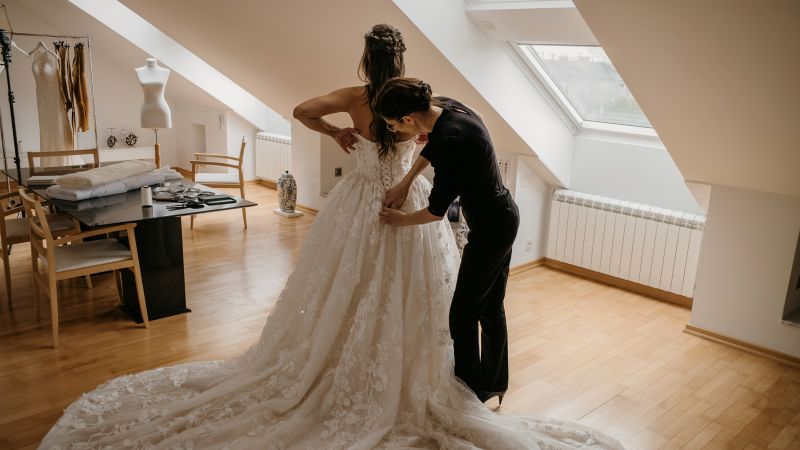A version of this story appeared in CNN Business’ Nightcap newsletter. To get it in your inbox, sign up for free, here.
Price distortions and dysfunction are nothing new in the $73 billion wedding industry. But the explosion of weight-loss drugs in the 2020s has created an extra snag for the seamstresses and designers responsible for the Big Day’s centerpiece garment: the bridal gown.
The Hollywood weight-loss secret is out, and it’s more accessible than ever. GLP-1 drugs, known by brand names Ozempic and Wegovy, have become widely available, in part through compounding pharmacies that offer cheaper, non-FDA-approved versions. (The Food and Drug Administration has warned consumers of risks associated with unapproved GLP-1 drugs, and a recent JAMA Network report found that immense demand has spurred a rash of illegal online pharmacies selling the drugs without prescriptions.)
And, as my colleague Tami Luhby reported this week, demand for these drugs is set to grow even more as employers increasingly consider covering them for weight loss — not just diabetes.
For better or worse, many brides are using the drugs ahead of their big day, lured in by the promise of rapid weight loss. That’s complicating the already complex business of buying and altering their gowns.
“The first issue is the dysfunction in the bridal industry right now, where it takes five to nine months to order a dress,” Susan Ruddie Spring, a designer and owner of bridal styling service The Wedding Dresser, told me recently.
Like many industries, bridal fashion went through a lull during the pandemic, followed by a rush of demand as couples rescheduled their nuptials.
Dress orders that used to take three months are now taking much longer, Spring said, in part because supplies from China are being rerouted away from violence near the Suez Canal, a vital thoroughfare that accounts a much as 15% of global trade.
That’s just one part of the timing issue.
The ideal time to buy a wedding dress is eight to 10 months before the event, according to wedding planning site the Knot, and some planners recommend buying a full year in advance in case of shipping delays.
But a lot can happen to a body over 10 months, especially when GLP-1 drugs are in the mix.
One study found that people with obesity or who are overweight lost as much as 15% of their body weight while taking tirzepatide, also known as Mounjaro, over the course of a year. Those taking semaglutide lost about 8%.
“I have recently had a couple of brides who lost about 50 pounds with Ozempic,” Spring told me. “Usually, the dress was ordered somewhere in the middle of those 50 pounds.”
It’s hard to overstate how such drastic weight loss can complicate a wedding dress’ fit. The garments are often structurally intricate, heavy with layers of expensive beading, tulle and lace, and, of course, weighed down by unmeasurable heaps of emotion and societal expectations.
That anxiety is palpable on various Reddit wedding and weight loss threads, where brides are looking for advice on how to buy a dress — likely the most expensive garment they’ll ever purchase — when they’re not sure what their bodies will look like a few months on.
The financial risk is real. While most gowns can be taken in several inches, there are limits, and brides who experience extreme weight loss could end up needing to purchase a new dress entirely. The average bridal gown retailed for $2,000 in 2023, according to the Knot. That’s before alterations, which can tack on hundreds or even thousands to the bill. (Dress and all, the Knot found that the average American wedding cost $35,000.)
The Ozempic effect is also stressing out seamstresses.
Each customer and dress is different, but Spring says that in general, a typical gown can rack up 20-40 hours worth of labor. That’s three one-hour fittings with the customer, plus anywhere from six to 12 hours of work in between.
But rapidly slimming brides create more work, and, in this case, that doesn’t necessarily translate into more money. Most tailoring businesses quote brides a flat rate for a set number of fittings and alterations at the start of the process, and seamstresses say they won’t penalize brides for losing weight.
“Brides will always lose weight because of stress preparing for the wedding,” said Myrna Lundberg, a senior tailor shop manager at Alterations Specialists in New York. But in her 40 years of working in the industry, she says, the expected 5-to-10-pound loss most brides experience has shot up with the rise of Ozempic.
“It’s really affecting our business, because, it’s more fittings, more time, more work — we lose money,” she said.
The steady stream of brides in need of drastic alterations is just one of the unintended downstream effects of the Ozempic Era. But it’s one that’s disproportionately hard on women, both for the bride grappling with generations of disordered expectations around weight, and for the people doing the labor that makes traditional wedding dress dreams come true.
The stress goes in both directions, Spring tells me.
“For brides, this expect expectation that you’re going to walk down the aisle looking like a model is crazy … And we do more work for the same amount of money.”
Seamstresses in the United States are overwhelmingly women, earning a median income of $37,000, according to the Bureau of Labor Statistics. They are also disproportionately immigrant women, who are often underpaid, and fashion insiders who spoke to CNN the Knot say many undocumented women are earning below-average wages under the table.
On top of the physical work of altering the gown, Lundberg notes there’s an emotional labor that comes with the job.
The GLP-1 drugs may be new, but the stress brides feel about their bodies and their weddings is not.
“Weight loss has always been a top of priority. So we just need to be very careful how we deal with them,” Lundberg said. “It’s not like you are their seamstress — it’s like you’re also their psychologist.”
Read the full article here




